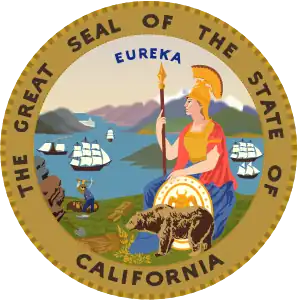Charles Krug
Charles Krug (1825–1892) was among the pioneers of winemaking in the Napa Valley, California, and was the founder of the Charles Krug Winery.
Charles Krug | |
|---|---|
 Charles Krug | |
| Born | 1 March 1825 Trendelburg, Kassel, Hessen, Germany |
| Died | 31 October 1892 |
| Occupation(s) | best known as a winemaker, was editor of "Staats Zeitung" (German newspaper in SF), Staff Member at Free Thinker's School (Philadelphia), Gold Refiner at SF Mint |
| Known for | Founded the second commercial winery in the Napa Valley |
Biography
Charles Krug visited the United States from Prussia in 1847, and became a citizen in 1852. In 1851 he served as an apprentice winemaker for Agoston Haraszthy and then John Patchett before establishing his own winery. Krug married Carolina Bale, the daughter of early Napa Valley pioneer and miller Edward Turner Bale and granddaughter of María Isidora Vallejo of the prominent Californio Vallejo family, on December 26, 1860.[1]
Krug was inducted into the Culinary Institute of America's Vintner's Hall of Fame in 2007.[2]
Winemaking
The dowry Bale left for her included 540 acres (2.19 km2) of land north of St. Helena, California, on which Krug planted a vineyard and founded his winery in 1861. Charles Krug introduced innovative ideas in winemaking to California. He began making wine using a cider press for pressing,[3] carefully selected rootstocks, varietals and vineyard sites. The knowledge he gained and shared benefited the young California wine industry.[4][5][6]
Charles Krug Winery
Following Krug's death, James Moffitt Sr. purchased the winery in 1894. In 1943, Robert Mondavi persuaded his parents, Cesare and Rosa Mondavi, to purchase the inactive winery from Moffitt for $75,000.[7] Robert Mondavi began his wine career there, until he founded his own winery in 1966. The winery still exists, and is owned by Robert's younger brother Peter Mondavi's family.[8]
References
- Davis, Kip (September 15, 2011). "Peter Mondavi leads Krug's 150th anniversary celebration". Napa Valley Register. Napa, CA: Lee Enterprises, Inc. Retrieved October 2, 2011.
- "Vintners Hall of Fame Inductees," Culinary Institute of America Archived 2014-10-06 at the Wayback Machine
- Palmer, Lyman L. (1881). History of Napa and Lake Counties, California: Comprising Their Geography, Geology, Topography, Climatography, Springs and Timber. San Francisco: Slocum, Bowen & Co. pp. 203.
Charles Krug cider press.
- Brennan, Nancy (2010-11-21). "John Patchett: Introducing one of Napa's pioneers". Napa Valley Register. Retrieved 2011-01-02.
- Heeger, Jack (December 7, 2004). "A peek at Napa Valley's hidden past". American Canyon Eagle. Napa, CA: Lee Enterprises, Inc. Retrieved October 2, 2011.
- Gaughan, Timothy (July 3, 2009). "When the valley met the vine: A perfect storm, and the big five". Napa Valley Register. Napa, CA: Lee Enterprises, Inc. Retrieved October 2, 2011.
- Siler, Julia Flynn (2008). The House of Mondavi: The Rise and Fall of an American Wine Dynasty. Penguin Books. ISBN 978-1-59240-367-7.
- Blue, Anthony Dias (1988). American Wine: A Comprehensive Guide. HarperCollins. ISBN 978-0-06-015914-6.
